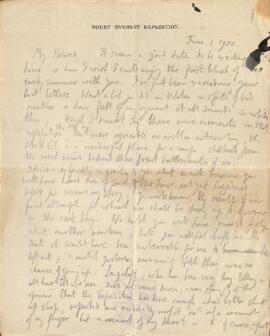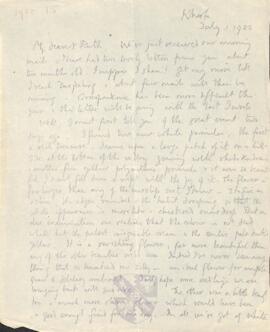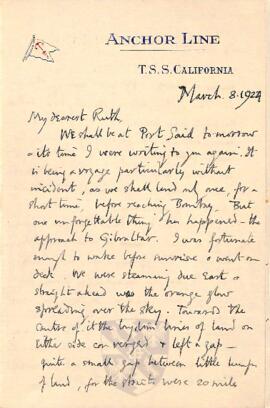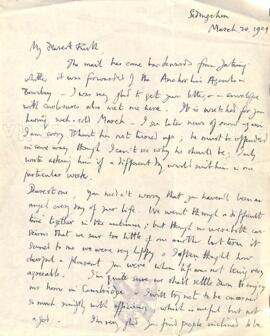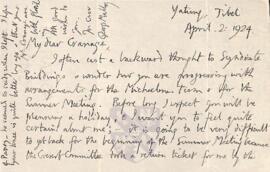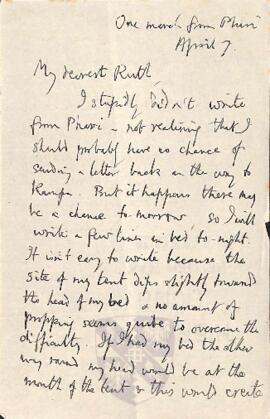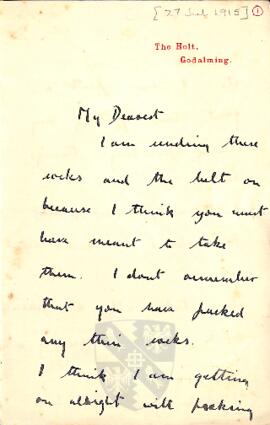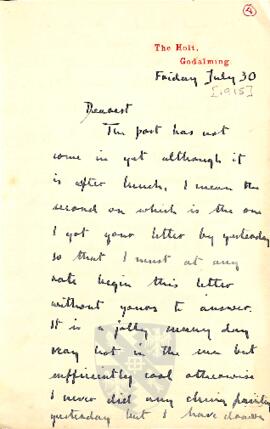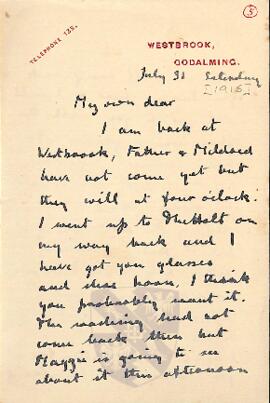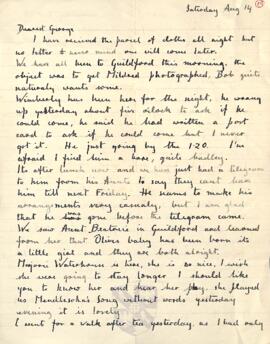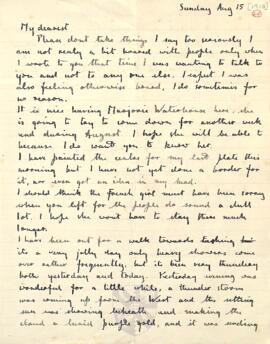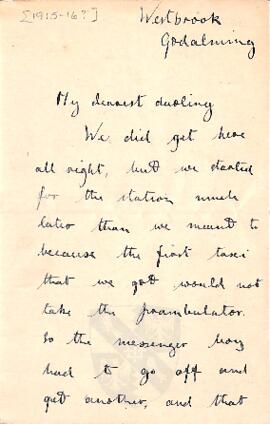Letter from George to Ruth Mallory from Kampa Dzong
Full Transcript
My dearest one,
As I sit in my tent writing I have at my side a pot of grease into which I occasionally dip a finger & then rub a little onto the sorer parts of my face. The wind & sun between them have fairly caught us all these last three days. Norton says that he was accused by his people after the last expedition of having acquired a permanent dint in his nose & he is determined to prevent the same thing happening again – but how to do it? Personally I limit my desire in that direction to keeping my nose the same size as usual; I don’t like to feel it swollen with sunburn. Somervell who started with a complexion tanned by the Indian suns, is now exactly the colour of a chestnut, and, as he greases freely, no less shiny. Beetham so far has the best beard, but then he had a start as he didn’t shave after Kalimpong & I’m inclined to back Geoffrey Bruce against him in the long run, as his will be blacker. The face with greatest number of flaky excrescences and cervasses is undoubtedly that of Hazard, & the underlying colour in his case is vermilion.
In my last letter I told you how well I was. But I have not been altogether well since then – something wrong with my tummy – a slight colitis or something of the kind. Consequently I have felt very feeble & as I am strictly dieted have little to sustain me beyond biscuits & jam. We shall have two clear days here and I shall have time to get better, & in fact I am already much better & haven’t the least doubt I shall be perfectly strong again when we are on the move once more.
Though we have almost exactly followed our tracks of 1922 from Phari to Kampa, it has been a very different journey – not only different companions & incidents, but a rather different Tibet. The second march from Phari landed us ½ a mile beyond the Blizzard Camp of ’22; we had no blizzard this time but neither had we the bright high lights of Tibet. Chomulhari, a mountain which impresses one more each time one sees it, was veiled at first in thin grey mist & then apparently caught it properly from the North; we were continually threatened at the other side of the great Tuna Plain & had a nasty wind in our faces, but escaped worse. I can’t tell you how much I am interested by the weather – it’s so difficult to make out what causes it or what the signs may mean or how it is to be compared with what we experienced in ’21 & ’22. This day I’m talking of was more like a day during the monsoon; in the evening smoky grey clouds were clinging to the hillsides as though the air were laden with moisture; & yet all the weather reports from India have shown a deficiency of moisture in Bengal. One of the novelties this year is our mess tent, Norton’s special child. It goes on in advance on a mule so as to be ready for us when we arrive – at least that is the idea; on the night I’m speaking of some of us were the first to arrive in camp & set to work pitching our ample green marquee. The first procedure is to lay down a string in the chosen spot marking the perimeter of the pegs; a placed is marked on this string against which each peg has to be driven in – driving pegs into stony ground at these altitudes makes one puff; the floor a large sheet of green canvas is placed in the correct position with the line of pegs & upon this the tent is hoisted. I must say it is a great success. It has perpendicular sides about 4 ft high below the slant of the roof & consequently there is ample headroom. The floor dimensions I should guess at 18’ x 9’. The mess waiters have plenty of room to pass behind us. The tables which are none of your gim-crack canvas-topped X pattern or other, but pukka wooden tables, with three-ply wooden tops & screw in legs, are 2’ 6” square made to fold into half that size & are arranged in series down the middle of the tent - & then cunningest device of all, there is a piece to go round the pole in the centre & fitting on to two half tables so that no gap is left. We have no tablecloths, as it was thought that our tables duly wiped would prove a cleaner way.
On the night of the second march from Phari (i.e. April 8) having pitched our tent we lay about in it waiting the arrival of (1) the cooks (2) the yaks. The former whose business it is to go on ahead & have a meal ready if possible or as soon as may be had lost themselves on this occasion. The yaks are in very poor condition & go even slower than I remember; the men with them (about 300 beasts) were too few so that loading up was very slow (2 to 3 hrs) in the morning, & one could hardly expect the bulk of the animals at the end of a long march before nightfall. So there we sat or rather lay out of the wind in our green tent chatting – chaffing until gradually one by one nearly everyone had a snooze; & as they lay there snoozing with faces rendered ghastly by the green light they looked like a collection of corpses.
The night of the 8th was decidedly chilly, the wind got up from an unexpected direction & blew violently into our tents; the minimum temperature was 4°. I should have told you however that before we turned in we were cheered by a clear view of Chomulhari. The point of Chomulhari is the way it dominates the plain. The view of it from Dochen reproduced in The Reconnaissance gives you some idea of what I mean; but coming across this way to Kampa Dzong we don’t go so far north & the further you go from the mountain the more its great wall of rock presents itself as the barrier of the world in which you are. Goodbye to Chomlhari – I should like to have a whack at him one of these days.
The march of the 9th corresponded with that of 1922 except that we stopped about 4 miles short of our last time’s camp; but it was a bitter journey; the wind blew in our faces all day often very strongly & terribly cold, & the sky was white or overcast & the sun had no warmth. And I had a bad tummy; I walked almost the whole way to keep warm; & it was very tiring work under those conditions. We camped in a good spot looking up nullah to Pau Hunri. The wind died down in the evening; the stars were bright & the temperature fell to 2° below zero. Beetham was up 15 times in the night.
The 10th was supposed to be a short march & a comparatively short day. The yak men had had enough of it on the previous day & consequently we made a very late start 10.45 I think. It was supposed that if we didn’t stop in last time’s camp 4 or 5 miles further on we should be able to stop 3 miles further on again. However no water was met with for another 10 miles. We went on & on over the wide plain sloping upwards; in the distance at last we saw a little cloud of smoke & a little later some flash of bright green near it – the smoke was from our cook’s fire & the green spot was our mess tent, which we reached towards sundown; & then turning to look back towards the east I saw the black battalions of yaks still a long way off & beyond them in the distance once more across the plain, nearly 40 miles away the great wall of Chomolhari, appearing as though the spurs of Pau Hunri which we had crossed with so much labour had no existence.
A beautiful camp this one with a velvet sided hill to the south of us & to the north a long line of hills near at hand, while the sunny side of Chomiomo appeared through a gap; & a good night not so cold.
On the 11th to Kampa; a pleasant & easy march with much looking at snow mountains, Chomiomo and Kanchenjunga principally. Everest was not clear as we came down to Kampa though we could make out where it was.
April 14. Yesterday we had the news that the General is not coming on. The possibility had been in the back of our minds since Yatung. We are all very sorry for him naturally. It is difficult to size up in a moment how much difference his absence will make. I don’t think the difficulties of travelling through Tibet will be considerably increased. The General’s influence with the porters must go for something; but Norton thinks that Geoffrey Bruce with his more direct contact with a personal knowledge of them counts for more. I expect myself the porters will work as well this year as in 1922. Still we’ve lost a force, & we shall miss him in the mess, and also his absence from the Base Camp will be inconvenient.
Meanwhile Norton takes command & we couldn’t have a better commander, he will do it much better than I could have done had I been in his place if only because he can talk the lingo freely. He has appointed me second in command in his place & also leader of the climbers altogether. I’m bound to say I feel some little satisfaction in the latter position.
I’ve been very busy these last two days formulating a plan of attack to be discussed as a commentary on Norton’s plan & we have just been having a general pow wow about the two schemes. I don’t know whether I told you anything about this before. Roughly N [Norton] proposes (a) 2 without oxygen establish Camp V at 26,500 & sleep there. Next day they go on & get as near as possible to the summit partly by way of reconnaissance, partly by way of taking the chance if it exists of getting to the top. (b) The day they go on a party of 3 with oxygen come up to V & are there to receive the first 2 & themselves go on next day.
The valuable points in this scheme are (1) that the oxygen party should not this way be let down by their load failing to arrive at V (2) that one attempt supports the other. The weakness & I think fatal weakness is that you spend 2 men making an attempt without the best chances of success, the best chance gasless being with 2 camps above Chang La; from the point of view of making the best possible gasless attempt supposing the 1st gas attempt fails two men have been wasted.
My adaptation therefore supposes;-
(a) Day 1 two with gas establish camp at 26,500. Next morning (1) if they feel strong & it is windless they start for the top.
(2) otherwise they wait & melt snow.
(b) 2 with gas come up to V on the second day. If (1) they support 1st party & if they have failed themselves make an attempt next day. If (2) all 4 go on together next day, in two parties of 2, an ideal mountaineering arrangement.
This leaves 4 men unimpaired for gasless VI camp attempt. Or this last may come first.
We had a very useful & amicable discussion of various points arising from these two plans & hope to get something settled by Tinkye.
Please don’t circulate this exposé of plans though of course you may tell climbing friends in confidence.
We are on the eve of resuming our march. The worst news is about Beetham who has not yet properly recovered from dysentery & is a very weak man. It is not yet decided whether we shall send him down to Lachen tomorrow. If he comes on & gets bad & Somervell (in the absence of Hingston with Bruce) has to take him back we shall have lost two of the best & be left without a medical officer, a very serious position. B [Beetham] is just on the turn; but even if he is going to get better up here it might pay better to send him down at once with a fair prospect of his rejoining us at the B. C. [Base Camp] about May 8 to 10.
This letter is full of news & very impersonal. Now about myself. I was able to feel definitely this morning that my trouble has passed. The tenderness in my gut is no longer sensitive, like an old bruise rather. I feel strong & full of energy & myself & I haven’t the least doubt I shall remain fit. I shall take every care to do so.
The warm pleasant days here have done us all good.
I’m happy & find myself harbouring thoughts of love & sympathy for my companions. With Norton of course I shall work in complete harmony; he is really one of the best. I read little what with Hindustani words & Sherpa names to learn, but I have occasional hours with Keats’ letters or the Spirit of Man which give perhaps more pleasure here than at home.
I have had no mail since I last wrote. If the English mail had been sent off as soon as it reached Phari we should have received it b now; but the arrangement is for the runner to come through & return so as to fit the out mail to England (a very bad arrangement on the surface) & consequently we shan’t get our letters before we get to Tinkye.
I’ve written to no-one but you this time. Please so what you can – at all events write to my people.
Dearest I wanted you very much to comfort me when I wasn’t well & I want you very much now to be happy with (not that I have been depressed).
Many many kisses to you & the children.
Ever your loving,
George
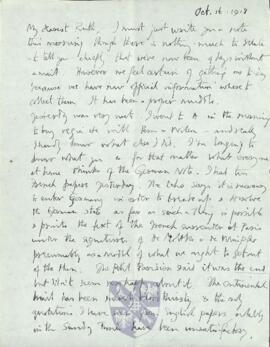
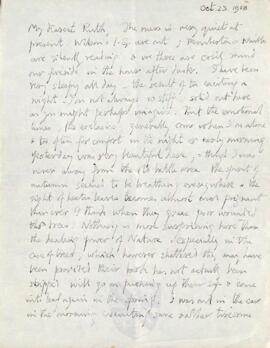
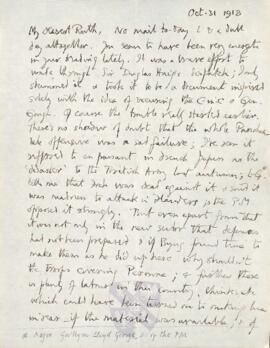
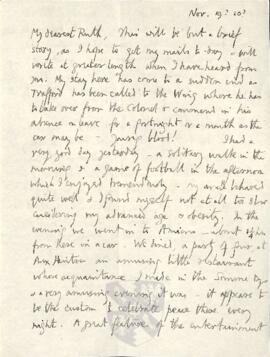
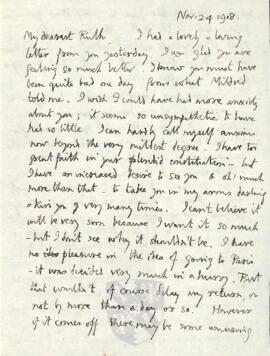
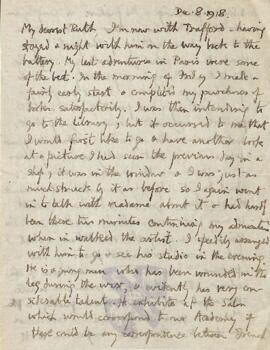
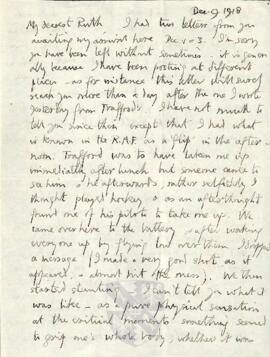
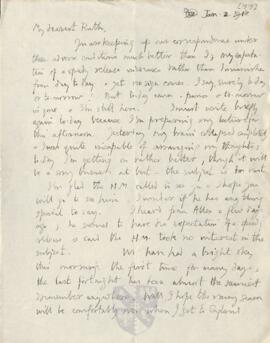
![Letter from George to Ruth Mallory, 8 June 1921 [first view of Mount Everest]](/uploads/r/null/b/0/8/b087a6ea8237585813251e913c908f81472ae581e133913d6193b97243ecb09c/PP_GM_3_1_1921_14_watermark_142.jpg)
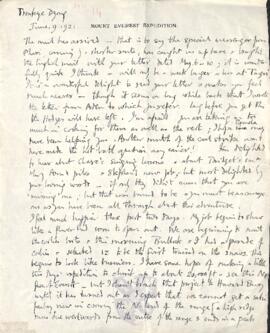
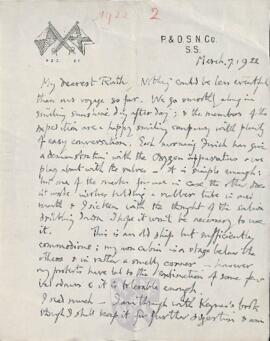
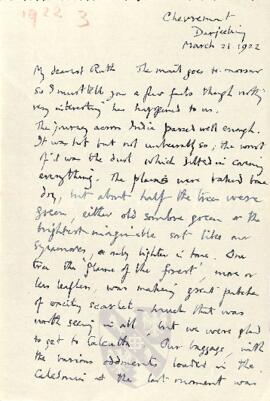
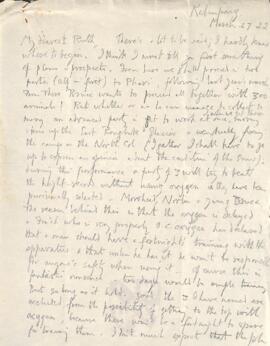
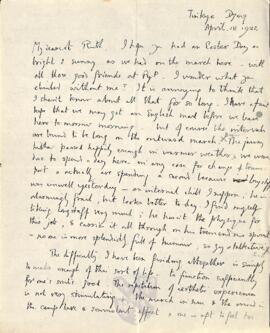
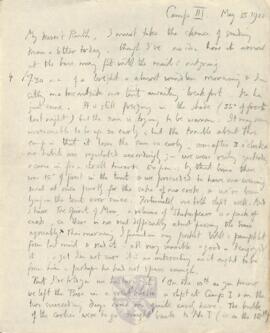
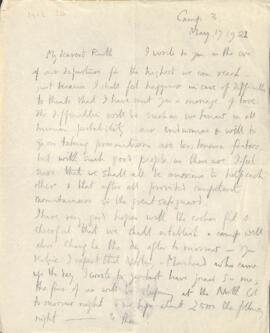
![Letter from George to Ruth Mallory, 26 May 1922 [first attempts to summit with and without oxygen]](/uploads/r/null/e/7/1/e713aa9025b80ad036db2212b403029949e0050e1f7d581c5ca4250b5afdcd7e/PP_GM_3_1_1922_15_watermark_142.jpg)
